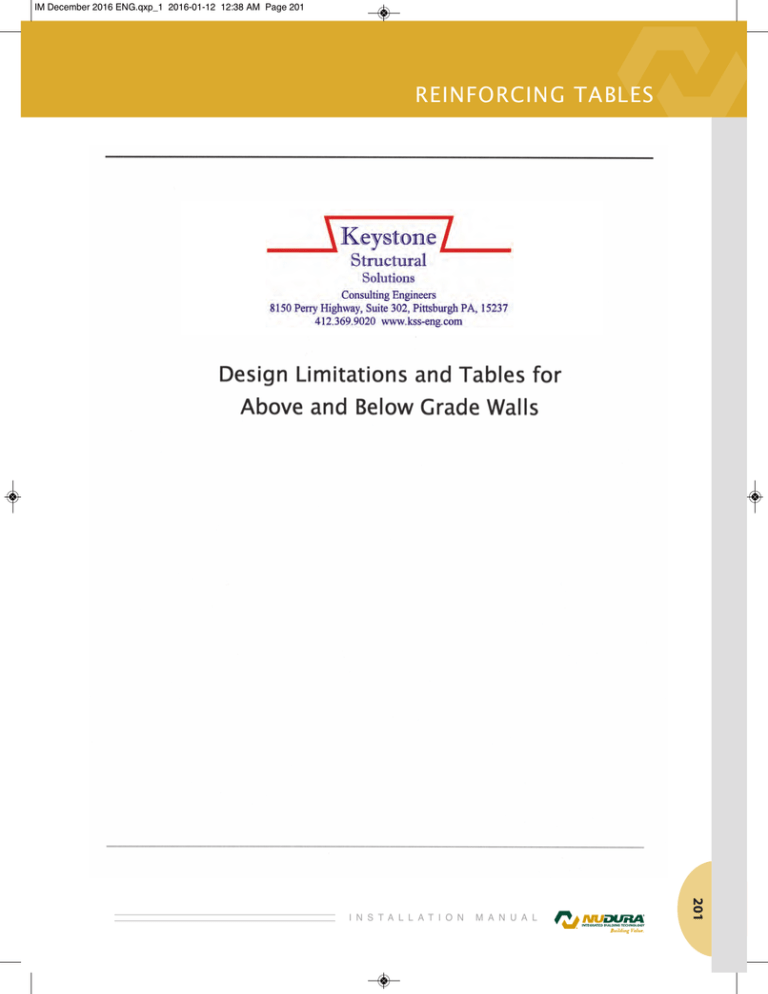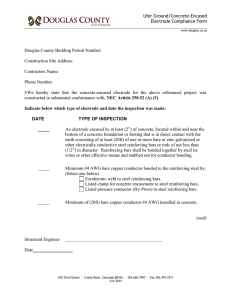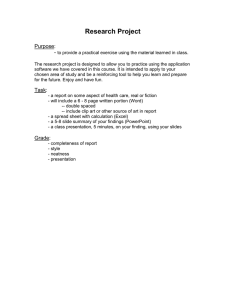reinforcing tables
advertisement

IM December 2016 ENG.qxp_1 2016-01-12 12:38 AM Page 201 REINFORCING TABLES M A N U A L 201 I N S T A L L A T I O N IM December 2016 ENG.qxp_1 2016-01-12 12:38 AM Page 202 REINFORCING TABLES Design Limitations Introduction The structural wall reinforcing and lintel design tables contained within the Appendix of NUDURA’s Installation Manual have been prepared consistent with the design principals and practices that have been applied throughout the United States ICF industry for prescriptive design of insulated concrete form walls. The intent of these specific tables is to enable design and building reviewing professionals to competently determine reinforcement requirements for walls specifically constructed using the NUDURA Integrated Building Technology Insulated Concrete Form System™. For this reason, reinforcement specifications may vary slightly from prescriptive reinforcement configurations that may be specified within the 2006, 2009 and 2012 International Residential Codes (IRC) or referenced documents therein, as the design reflects the specific geometry and reinforcement capabilities that are unique to the NUDURA Wall System. Design - General 1. These tables apply to one and two family residential structures that conform to the requirements of the 2006, 2009 or 2012 IRC and referenced design guides. All construction shall comply with the appropriate local building Codes. 2. It is the responsibility of the parties involved, including the builder and subcontractors, to review the applicability of these tables and notes to the project specific conditions. The Kachele Group and NUDURA assume no responsibility with regard to the misinterpretation or misuse of the attached tables. 3. If the proposed construction does not meet the design or applicability parameters noted herein, a local design professional shall be retained to prepare the design in accordance with applicable standards and design Codes. 4. These tables have been designed to resist gravity, wind, and earthquake forces, as specifically noted, in accordance with the International Residential Code, along with the design loads and factors that are indicated in Notes 5 & 6 and within the structural tables contained in this appendix. 202 I N S T A L L A T I O N M A N U A L IM December 2016 ENG.qxp_1 2016-01-12 12:38 AM Page 203 REINFORCING TABLES 5. The following maximum UNFACTORED loads were assumed in the design of the structural tables featured in this appendix: A) Roof Snow Load (Live) = 49 psf (70 psf ground snow load) B) Occupancy Load (Live) = 40 psf C) Roof and Floor Load (Dead) = 15 psf D) Soil Equivalent Fluid Pressure = 30, 45, and 60 psf / ft E) Concrete Density (Dead) = 150 lb/ft3 F) Seismic Design Categories A, B, C, D0, D1, and D2 6. Design assumes that ALL walls are laterally supported at the top and bottom by building foundation, roof and floor systems, and associated diaphragms, designed by others. 7. Design limits concrete deflection to L/480. 8. Foundation walls are not designed for either hydrostatic pressure or additional lateral soil pressure associated with surcharge loading. These loading conditions require additional review. 9. Design assumes that the minimum 28 day compressive strength of concrete used in the installation shall be 3,000 psi. Actual design of the concrete mix is the responsibility of the ready mix supplier. 10. Design assumes that the reinforcing steel will be deformed rebar, placed in accordance with standard industry practice and ACI placement requirements and shall be supplied at the following yield strength: • ASTM A615 Grade 60 (fy = 60 ksi) • Grade 40 reinforcement may be substituted at 1.5 times the number of bars noted, or similarly 2/3 the spacing listed for requirements specified as ‘on center spacing’ 11. All wall reinforcement shall be proportionally and evenly distributed in both the transverse and longitudinal directions of the building. M A N U A L 203 I N S T A L L A T I O N IM December 2016 ENG.qxp_1 2016-01-12 12:38 AM Page 204 REINFORCING TABLES Design Limitations 12. The following maximum building dimensions are permitted for use: A) Building Width = 60 ft B) Floor Span = 32 ft C) Roof Span = 40 ft 13. Design is limited to one floor below grade and a maximum of two stories above grade, as well as a maximum mean roof height of 35 feet. 14. Maximum height of above grade walls = 10 ft. Reinforcement and wall information provided beyond this height as indicated by tan shaded section on each design table is for estimating purposes only. A local design professional is to be contacted for a site specific design at these locations. 15. Maximum height of foundation walls = 10 ft. Reinforcement and wall information provided beyond this height as indicated by tan shaded section on each design table is for estimating purposes only. A local design professional is to be contacted for a site specific design at these locations. 16. It is the responsibility of the roof or floor designer to ensure that adequate bearing for all framing members is provided on the concrete walls. Use of Design Tables Specific Notes Regarding Vertical & Horizontal Steel Specifications General 17. Height of foundation wall is defined as “the distance from the top of the basement floor slab to the point of bearing for the floor system”. 18. Backfill height is defined as “the distance from the top of the basement floor slab to the finished exterior grade level”. 204 I N S T A L L A T I O N M A N U A L IM December 2016 ENG.qxp_1 2016-01-12 12:38 AM Page 205 REINFORCING TABLES 19. Except as otherwise indicated in Details C-12 through C-16, C-17 and C-19, all below grade wall vertical reinforcing shall be placed with the center axis of the bar being located 1 1/2" from the interior face of the concrete in the ICF forms (on the tension side of the wall). 20. Interpolation between backfill heights and soil equivalent fluid density is not permitted. 21. For walls above grade, vertical reinforcing shall be placed at the middle (or center axis) of the wall. 22. Horizontal reinforcing shall consist of #4 continuous bars at 36” on center, which includes (1) #4 continuous bar within 12” from the top of the wall and at floor levels, unless noted within the wall tables. Rules for Reinforcement at Openings 23. In addition to the wall reinforcing indicated with the design tables of this appendix, a minimum of (2) #4 bars shall be installed at both sides of all openings in concrete, maintaining a minimum cover of 1!”. Bars shall extend vertically for the full height of the wall pour, as shown in drawing L1 located within the “Lintel Design Limitations” document for concrete lintels. Vertical bars shall be installed with adequate splices at construction joints. (2) #4 bars shall also be installed at the base of the opening, again extending bars a minimum of 24” beyond both sides of the opening. 24. For foundation walls, the length of solid wall between two openings should be equal to the average width of the openings and shall be no less than a minimum of 4’-0”. 25. Openings in a foundation wall shall not exceed a maximum width of 6’-0”. Egress walls outside of the foundation shall be self supporting and shall not be designed or constructed to induce additional lateral loading on the ICF foundation. 26. Each foundation wall shall not have a total width of openings in the wall constituting more than 25% of the length of the wall. M A N U A L 205 I N S T A L L A T I O N IM December 2016 ENG.qxp_1 2016-01-12 12:38 AM Page 206 REINFORCING TABLES 27. For sections of wall between openings conforming to the above notes, the spacing of the vertical reinforcing must be decreased in these walls by a factor as calculated within the following formula: width of wall between openings . (width of wall between openings + average width of the two openings) 28. If the spacing of the wall vertical reinforcing required between or on each side of openings is determined by the above calculation to be less than 4”, a local design professional shall be retained to prepare the design in accordance with applicable standards. Shear Walls 29. Shear walls and lateral resisting elements are to be in accordance with the 2006, 2009 or 2012 IRC. Refer to the additional referenced PCA 100 design guide where required by these Codes, including Seismic Design Category D, and wind speeds exceeding 130 mph, 110 mph, and 100 mph for exposure categories B, C, and D respectively. 30. Reinforcement tables are not to be used for structures classified as irregular in Seismic Design Categories C and D. 31. Reinforcement tables are not to be used for structures located where topographic factors may induce additional lateral loading. Point Loads 32. All point loads, such as concentrated loads created by girder trusses, columns and beams, shall bear directly on top of the concrete wall, and shall not be hung or in any other manner create an eccentric loading on the concrete wall. 33. The minimum horizontal length of solid wall without openings directly below point loads, such as concentrated loads created by girder trusses, columns and beams, shall be 6’-0”. In addition to the wall reinforcing required within the structural tables of this appendix, two additional #5 vertical bars shall be installed directly below the point load. 206 I N S T A L L A T I O N M A N U A L IM December 2016 ENG.qxp_1 2016-01-12 12:38 AM Page 207 REINFORCING TABLES Reinforcement at Corners 34. Two full height vertical bars, equal to the vertical reinforcing within the wall system, are to be installed at all corners. Installation General 35. The design and construction of all work on site shall conform to the latest editions of the applicable building codes for the region where installation is taking place, including local applicable code regulations and bylaws as well as all applicable health and safety regulations. Footing Reinforcement 36. Strip footings are to be fitted with dowels to provide connection between the footing and the wall cavity. Dowels shall be installed along the center axis of the strip footings and shall be installed as per the details shown in this appendix. 37. Where footings or frost walls are not a requirement, when the footing is incorporated as part of a slab on grade foundation, dowels shall be embedded in the slab at equal size and spacing as the vertical reinforcement. Minimum embedment into both the slab and wall cavity shall be consistent with bar development and lapping requirements. General Reinforcement Installation 38. Reinforcement placement must be in accordance with the specified design as per these notes and drawings produced in accordance with the NUDURA Structural Tables contained in Appendix C. 39. Minimum bar lap length shall be 40 bar diameters. M A N U A L 207 I N S T A L L A T I O N IM December 2016 ENG.qxp_1 2016-01-12 12:38 AM Page 208 REINFORCING TABLES Concrete Placement 40. Concrete work shall conform to the latest editions of ACI and ASTM standards for materials, placement, and workmanship: 41. Construction joints shall be made and located so as not to impair the strength of the structure. All specified reinforcing bars shall have minimum lap lengths across all construction joints. 42. Placement of concrete including adequate vibration is the responsibility of the contractor. 43. Concrete pours shall be terminated at locations of lateral support, such as provided by roof and floor systems. Protection of Structure During Installation 44. Adequate frost protection shall be provided for all foundation walls and footings both during construction and in the final installation. 45. The contractor shall make adequate provision to protect concrete from exposure to freezing temperatures and precipitation for at least seven days after concrete placement. 46. Backfill shall be drained in accordance with IRC requirements 47. Walls shall be laterally supported at top and bottom prior to backfilling. 48. Surface grading around the foundation shall be sloped away from building to allow surface runoff to drain away. Provide a minimum slope of 6” over the first 10 feet or adequate drainage swales. 49. The contractor shall make adequate provision for construction loads and temporary bracing to keep structure plumb and in true alignment at all phases of construction. 208 I N S T A L L A T I O N M A N U A L IM December 2016 ENG.qxp_1 2016-01-12 12:38 AM Page 209 REINFORCING TABLES 50. All work shall conform to the latest editions of ANY of the following codes and standards that are deemed applicable for your region including but not limited to: • 2006, 2009 or 2012 International Residential Code. • Document PCA 100 as referenced in the 2009 and 2012 IRC. • Local building codes, local regulations, and laws • Occupational Safety and Health Association Regulations. M A N U A L 209 I N S T A L L A T I O N IM December 2016 ENG.qxp_1 2016-01-12 12:38 AM Page 210 REINFORCING TABLES D-1 210 I N S T A L L A T I O N M A N U A L IM December 2016 ENG.qxp_1 2016-01-12 12:38 AM Page 211 REINFORCING TABLES D-2 M A N U A L 211 I N S T A L L A T I O N IM December 2016 ENG.qxp_1 2016-01-12 12:38 AM Page 212 REINFORCING TABLES D-3 212 I N S T A L L A T I O N M A N U A L IM December 2016 ENG.qxp_1 2016-01-12 12:38 AM Page 213 REINFORCING TABLES D-4 M A N U A L 213 I N S T A L L A T I O N IM December 2016 ENG.qxp_1 2016-01-12 12:38 AM Page 214 REINFORCING TABLES D-5 214 I N S T A L L A T I O N M A N U A L IM December 2016 ENG.qxp_1 2016-01-12 12:38 AM Page 215 REINFORCING TABLES D-6 M A N U A L 215 I N S T A L L A T I O N IM December 2016 ENG.qxp_1 2016-01-12 12:38 AM Page 216 REINFORCING TABLES D-7 216 I N S T A L L A T I O N M A N U A L IM December 2016 ENG.qxp_1 2016-01-12 12:38 AM Page 217 REINFORCING TABLES D-8 M A N U A L 217 I N S T A L L A T I O N IM December 2016 ENG.qxp_1 2016-01-12 12:38 AM Page 218

